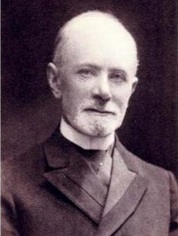Alfred Loisy
| Alfred Loisy | |
|---|---|
 |
|
| Born |
Alfred Firmin Loisy 28 February 1857 Ambrières, Second French Empire (now France) |
| Died | 1 June 1940 (aged 83) Ceffonds, Military Administration in France (now France) |
| Alma mater | Institut Catholique de Paris |
| Occupation | Priest, professor, theologian |
| Years active | 1879–1931 |
| Known for | Founder of Biblical Modernism in the Roman Catholic Church |
| Works | (See list below) |
Alfred Firmin Loisy (French: [lwazi]; 28 February 1857, Ambrières, Marne – 1 June 1940, Ceffonds, Haute-Marne) was a French Roman Catholic priest, professor and theologian generally credited as a founder of Biblical Modernism in the Roman Catholic Church. He was a critic of traditional views of the biblical creation, and argued that biblical criticism could be applied to interpreting Sacred Scripture. His theological positions brought him into conflict with the Church's conservatives, including Pope Leo XIII and Pope Pius X. In 1893, he was dismissed as a professor from the Institut Catholique de Paris. His books were condemned by the Vatican, and in 1908 he was excommunicated.
Loisy's most famous observation was that "Jesus came proclaiming the Kingdom, and what arrived was the Church" ("Jésus annonçait le Royaume et c'est l'Église qui est venue": Loisy 1902), and he is often taken to have said that with a note of regret (Loisy 1976: 166). But for all his clashes with the Roman Catholic hierarchy, Loisy did think that Jesus intended to form some sort of society or community. It was the aping of civil government ("comme celle d'un gouvernement établi"; Loisy 1902: 152) that he doubted Jesus intended.
Born on 28 February 1857 at Ambrières, Loisy was put into the ecclesiastical school of Saint-Dizier at four years old. He decided for the priesthood and was educated within the Catholic system, from 1874 to 1879 at the Grand séminaire de Châlons-en-Champagne; he entered the Institut Catholique de Paris in 1878/1879. Prior to his ordination to the subdiaconate, he had experienced doubts regarding the soundness of the Catholic faith. After an illness he returned to the Institut and was ordained a priest on 29 June 1879. Initially assigned parish work, in 1881 he requested to be reassigned to the Institut to complete his baccalauréat in theology. That autumn he became instructor in Hebrew. He took additional courses in Hebrew with Ernest Renan at the Collège de France. He was also influenced, as to biblical languages and textual criticism, by the Abbé Paulin Martin, and as to a consciousness of the biblical problems and a sense of form by the historical intuition and irony of Abbé Louis Duchesne. He took his theological degree in March 1890, by the oral defense of forty Latin scholastic theses and by a French dissertation, Histoire du canon de l'ancien testament, published as his first book in that year. By the time he took a course at Saint-Sulpice in scriptural interpretation, he was already disillusioned with the Church's belief in the virgin birth and resurrection.
...
Wikipedia
